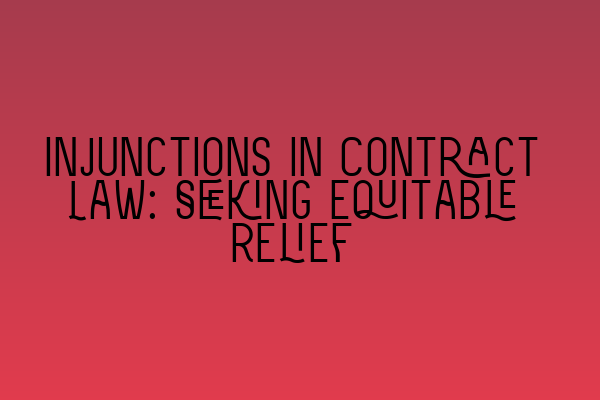Injunctions in Contract Law: Seeking Equitable Relief
In the realm of contract law, situations may arise where one party fails to fulfill their obligations or breaches the terms agreed upon. In such cases, aggrieved parties often seek legal remedies to protect their rights and interests. One of the most powerful tools available in contract law is the injunction, which provides equitable relief by compelling or prohibiting a certain action. In this article, we will explore the concept of injunctions in contract law and discuss how they can be sought to ensure justice is served.
Before delving into the specifics of injunctions, let us first understand the basic principles of contract law. A contract is a legally binding agreement between two or more parties, which establishes the rights and obligations of each party. When one party fails to perform their duties as specified in the contract, it results in a breach. In such cases, the aggrieved party has various remedies available to them, including seeking monetary damages or specific performance.
However, there are instances where monetary damages or specific performance alone may not be sufficient to provide adequate relief. This is where injunctions come into play. An injunction is a court order that either compels one party to perform a specific action or prohibits them from engaging in certain conduct. In essence, it is a preventive measure that seeks to maintain the status quo or rectify an ongoing breach of contract.
Injunctions can be classified into two main types: prohibitory injunctions and mandatory injunctions. Prohibitory injunctions, as the name suggests, prohibit a party from performing a certain act or engaging in specific conduct. On the other hand, mandatory injunctions require a party to take a certain action or fulfill their obligations under the contract. The decision on whether to grant a prohibitory or mandatory injunction is based on the underlying facts and circumstances of each case.
To obtain an injunction, the aggrieved party must satisfy certain legal requirements. Firstly, they must establish a prima facie case, demonstrating that they have a valid and enforceable contract with the other party. Secondly, they must provide evidence that the other party has breached the contract or is likely to breach it in the near future. Finally, they must demonstrate that damages or other remedies available at law are insufficient to provide adequate relief.
Once these requirements are met, the aggrieved party can file a claim seeking an injunction. It is crucial to note that injunctions are discretionary remedies, which means that the court has the discretion to grant or deny them based on the circumstances of the case. In assessing whether to grant an injunction, the court considers various factors, including the balance of convenience, the likelihood of success on the merits, and the potential harm that may be suffered by the parties.
Injunctive relief can be a powerful tool in contract law, as it allows parties to preserve their interests and prevent irreparable harm. By seeking equitable relief through an injunction, aggrieved parties can ensure that their rights are protected and the breach of contract is remedied effectively. However, it is essential to consult with a qualified solicitor who specializes in contract law to assess the viability of seeking an injunction in a particular case.
In conclusion, injunctions in contract law provide aggrieved parties with a powerful remedy to ensure justice and protect their rights. These court orders compel or prohibit certain actions in order to rectify breaches of contract or prevent ongoing harm. Whether seeking a prohibitory or mandatory injunction, it is crucial to satisfy legal requirements and seek guidance from a solicitor specialized in contract law. By understanding the intricacies of injunctions and their potential impact, aggrieved parties can pursue equitable relief and seek the justice they deserve.
Related Articles:
– SQE 1 Practice Exam Questions
– SQE 1 Practice Mocks FLK1 FLK2
– SQE 2 Preparation Courses
– SQE 1 Preparation Courses
– SRA SQE Exam Dates
